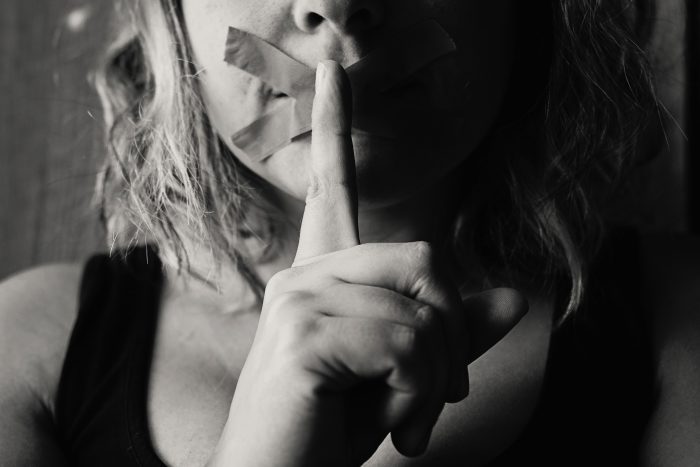I learned a valuable lesson recently.
One of my essays was removed from Elephant Journal because it involved details of an abusive relationship I left years ago.
I’m not upset that the publication decided to remove this article in order to protect themselves from a potential lawsuit. I completely understand the decision; I respect and support it. I also appreciate them protecting me by protecting themselves. I hadn’t intended to leave myself vulnerable.
I hadn’t written my essay in complete ignorance of anti-defamation lawsuits. I am aware that slander and libel laws exist. I had thought not revealing a name was enough to protect me and the other party involved; I was wrong. Apparently, if you include enough details that someone who knows you or knows your abuser can ascertain who you are referring to, you are in risky territory, legally speaking.
Forgive my salty language, but this is f*cking bullsh*t!
As a survivor of domestic abuse, the last thing I need is to continue keeping my abuser’s secrets. Secrets make you sick. As a survivor, I know in my bones that it is imperative to my healing to be able to share my story. Because that is what it is—my story!
I didn’t write that essay to rake someone over the coals. I didn’t write it to sully someone’s reputation. I wrote it because I believe that the only way we will ever lessen the stigma and shame of domestic abuse is if we start talking about it. We need to open a dialogue about how widespread domestic abuse is in our society.
Domestic abuse is pervasive. One in three women in the United States will experience intimate partner violence in their lifetime. How many more experience emotional and verbal abuse? How many will experience coercive control?
Not all domestic abuse is physical, and not all women realize they are in an abusive relationship until the abuse escalates into physical violence. If survivors could share their stories without fear of lawsuits, women who are experiencing the early stages of abuse might recognize themselves in these stories, and maybe—hopefully—they could get help and get out before their situation escalates into a dangerous living environment.
Survivors need to be able to share their stories without fear of coercive and controlling lawsuits designed to protect abusers. Just to be clear, I don’t think it is okay to make up lies to sully the name of someone who did you dirty, but I do think our judicial system protects the reputation of abusers at the expense of their victims.
Even if an abuser knows the allegations are true and those allegations can be confirmed by court documents, this doesn’t stop them from being able to file a lawsuit. These lawsuits can financially destroy the victim, even if the lawsuit is thrown out or the case is lost. Abusers can use our judicial system to muzzle the first amendment rights of victims by restricting their freedom of speech. This issue is central to the #MeToo movement. Is this not somehow enabling another form of harassment and control of victims through the allowance of legal intimidation tactics?
It needs to stop.
Anti-defamation lawsuits are on the rise and have been used against memoirists telling their stories of abuse and neglect. They have been levied against accusers in the #MeToo movement, and against women who have publicly shared their survivor stories though local women’s organizations like Someplace Safe. It is no secret that powerful and wealthy men have long used the legal system to squash allegations of sexual misconduct through non-disclosure agreements and settlements.
With the drastic rise in the number of anti-defamation lawsuits since the #MeToo movement, how many survivors will be silenced by this fear of litigation? How many women will choose to not tell their story, despite knowing it could help them heal and help others see a path out of their personal hell? And all because they are afraid of the potential legal and financial ramifications?
Why must victims still be responsible for keeping their abusers’ secrets?
If you want to be spoken of kindly, remembered kindly, and thought of kindly, you should have behaved kindly. It isn’t my job to protect anyone’s reputation but my own; how we do this is by behaving with integrity and using our words wisely. My abuser did not behave with integrity, and they did not use kind words. While everything I claimed did happen—and there are public record documents supporting my claims—I still feel nervous about sharing these details now that I know there could be legal ramifications.
Why am I supposed to keep my abuser’s secrets, when those secrets are part of my steps toward freedom, healing, and happiness? I wanted to tell my story so that others who are suffering through the same torment I once did could see that there is hope, healing, and happiness outside of and away from an abusive relationship. I want to tell my story so others can recognize themselves in this story and know they aren’t alone.
I can’t express how frustrating it is to realize the only way I can tell my story without fear of litigation is if I edit out all defining characteristics and make it so weak and vague that it loses all power and poignancy, and ceases being my story.
I want our judicial system to stop protecting abusers and start protecting victims. I want to raise my voice.
It isn’t about my abuser. They’re just a bit part player, an antagonist, a detour. I’m the protagonist of my story, and I want to be free to tell it.












Read 15 comments and reply